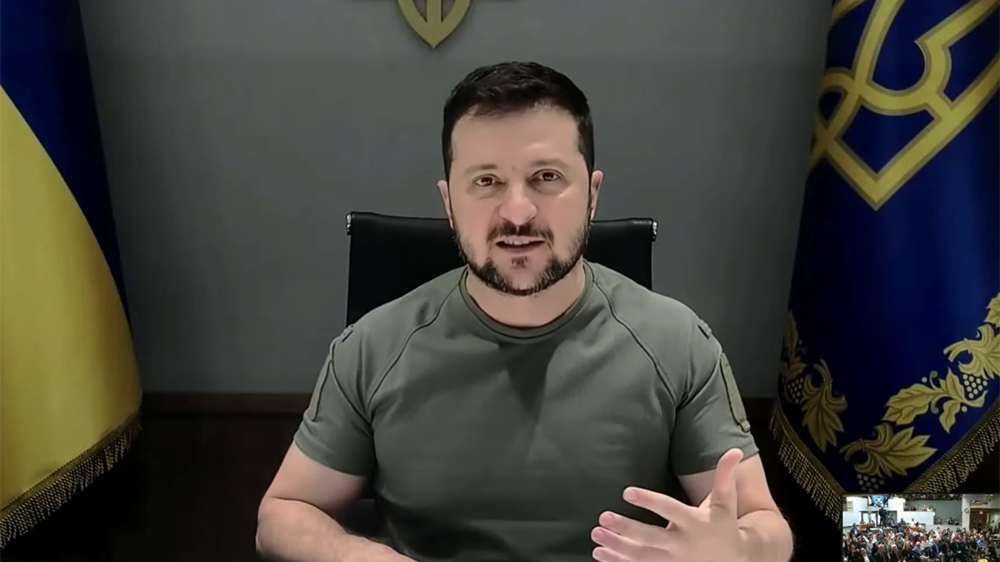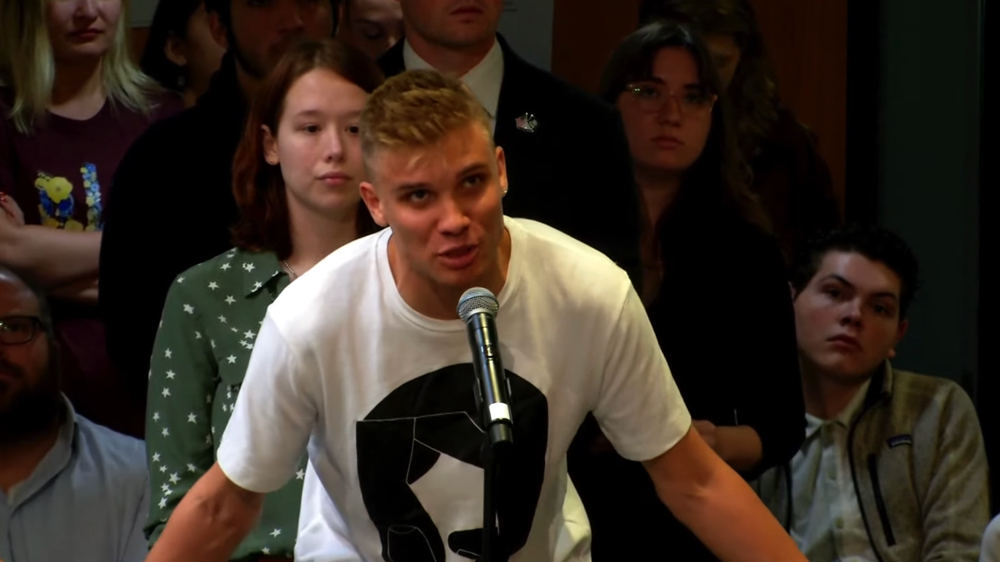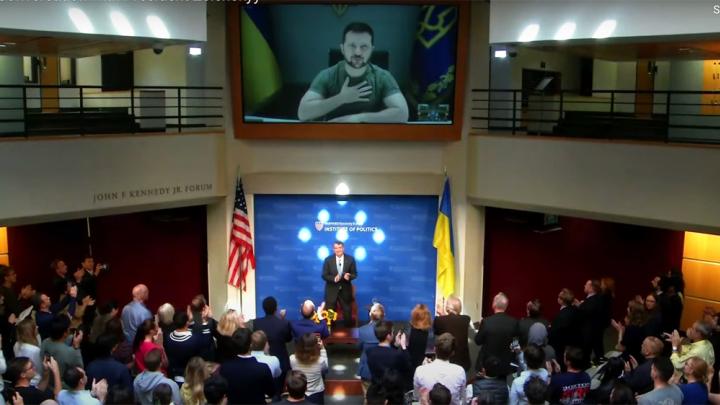“We want to become whole again,” Ukrainian President Volodymyr Zelenskyy said Tuesday, speaking via video conference to a capacity crowd at the Harvard Kennedy School’s Institute of Politics, where he delivered a brief address and took questions from audience members.
In his remarks, Zelenskyy denounced Russian president Vladimir Putin’s renewed threats of nuclear attacks as a “blackmailing statement” and rebuked the recent referenda—dismissed by most Western leaders as a sham—in which Russian officials claimed that citizens in four occupied regions voted to join Russia. Speaking through an interpreter, Zelenskyy warned his Harvard audience that the “so-called” vote is an attempt to grab more territory in his country: “There’s no limit to this annexation.”
The Ukrainian leader urged “preventive” action from the West in the wake of Putin’s most recent statements: “The ability to prevent is the key feature in leadership,” he said, warning about what happens when leaders are “so afraid of deadly consequences that they pretend they don’t hear anything until the catastrophe looms.”
“Preventive action would mean that the world is not ready to swallow everything Russia wants to feed it,” he said.
Zelenskyy’s comments echoed remarks he gave the same day at the United Nations Security Council. In that address, he called on world leaders to remove Russia as a permanent member of the Security Council and exclude it from all international organizations, to strengthen sanctions against Russia, and to give Ukraine financial and military support, as well as “clear and legally binding guarantees of collective security.”
To his Harvard audience, Zelenskyy said: “Prevention is the basis for lasting peace, a measure to cut short any aggression, and a measure to save many more lives than you will save by reacting to something that has already happened.”

Zelenskyy
Screenshot by Harvard Magazine
The event was moderated by Belfer professor of technology and global affairs Ashton Carter, former U.S. Secretary of Defense. “I have a particular heart for Ukraine,” Carter said during his opening remarks, recalling that as the U. S. Assistant Secretary of Defense for International Security Policy during the 1990s, he had been responsible for the program that removed nuclear weapons from Ukraine, Kazakhstan, and Belarus. “In those missile fields, after we blew up the silos, the Ukrainian government planted sunflowers,” Carter said, pointing to a bowl of sunflowers placed on the table in front of him in the auditorium.
Turning to Zelenskyy, Carter asked, “What does victory look like for Ukraine?”
Zelenskyy’s answer was swift: “We will have to restore our territorial integrity,” he said. “We'll have to restore the recognized borders. And not just because it is simply just. It is our land. We need to also feel it for ourselves that the war is over, that the peace has been regained….We want to become whole again,” free of any occupation. “We need to recover the whole the totality of the country. This is about justice.”
He also returned to the idea of the sunflowers. “You know, the decision to abolish nuclear weapons wasn’t done by chance,” Zelenskyy said. “We are resilient, like the sunflowers we grow on our own lands.” Victory, he added, is “about our ability to demonstrate that, yes, we will stand by the sunflowers,” and the peace they represent.

A student from Kharkiv, in eastern Ukraine, asked how he and other students could best help their country.
Screenshot by Harvard Magazine
Audience members, including Harvard students from Ukraine, asked about Zelenskyy’s transition into politics and leadership, and the international community’s ability to counter Russia’s nuclear threats. A student from Kharkiv, in eastern Ukraine, asked a question on behalf of other students like him, about how best to use the knowledge and resources they’ve gained abroad to help Ukraine now and in the difficult years to come: “Because there are so many Ukrainians who are willing to come back to our home country, rebuild it, help it grow.”
Another student, an American military veteran who said he’d spent the past five months in Ukraine providing humanitarian aid and training, asked about reintegrating soldiers back into civilian society after the war has ended. It’s a “common problem,” the student said. “I know the Americans are still trying to learn it.”
Retired General Joseph Dunford, former chairman of the Joint Chiefs of Staff who is now a senior fellow at the Kennedy School’s Belfer Center for Science and International Affairs, asked the Ukrainian president to reflect on what he’d learned about leading in a crisis. “Do not pay attention to something petty,” Zelenskyy answered. “Do not get offended. Focus on your task, and move ahead. Never stop. Because this is war.” A moment later, he added, “They say that courage loves leaders….We have always loved our country. We love living here. Now it is not enough just to live in Ukraine and love Ukraine. You have to be ready to give your life for Ukraine. This is the true leadership.”








